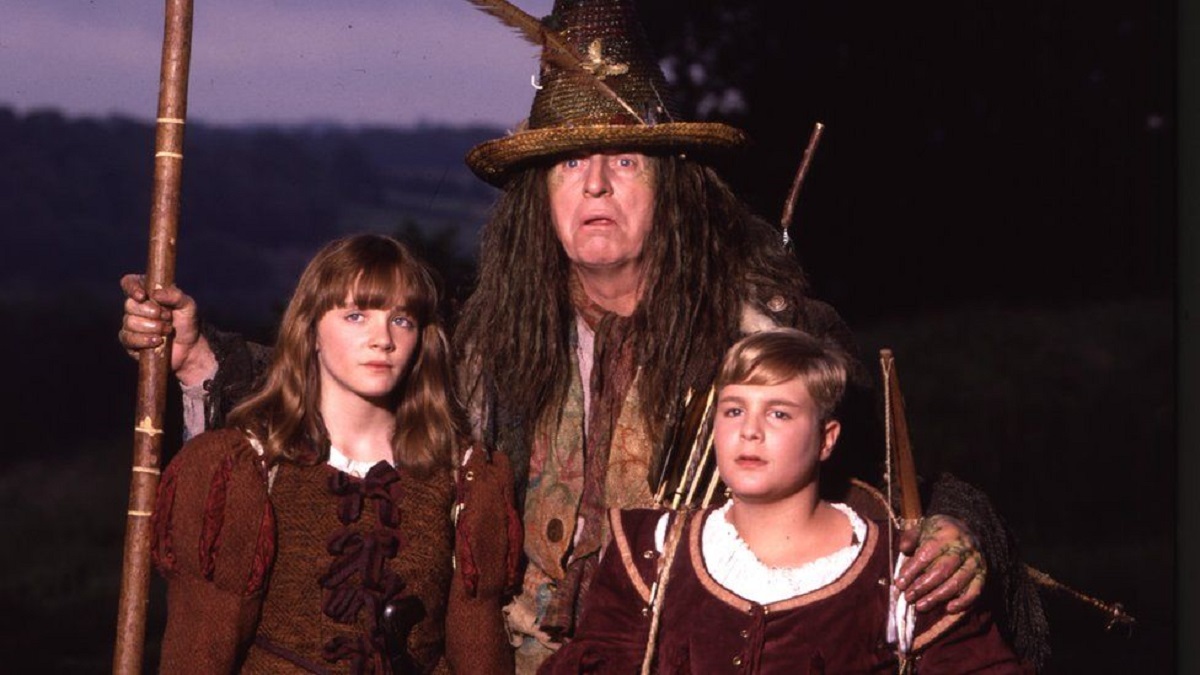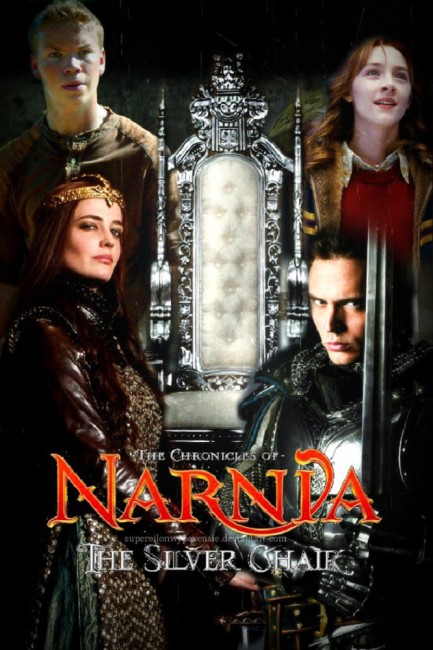Crew
Director – Alex Kirby, Screenplay – Alan Seymour, Based on the Novel by C.S. Lewis, Producer – Paul Stone, Music – Geoffrey Burgon, Visual Effects Design – Mickey Edwards & Tony Harding, Video Effects Design – Robin Hobb, Flying Sequence – Sam Heaphy, Aslan, Centaur & Dragon Designed by Vin Burnham, Makeup/Masks – Denise Baron, Mark Phillips & Jane Walker, Design – Sarah Greenwood, Alan Spalding & Adrian Uwalaka. Production Company – BBC TV/Wonderworks.
Cast
David Thwaites (Eustace), Camilla Power (Jill Pole), Tom Baker (Puddleglum), Richard Henders (Prince Rilian), Barbara Kellerman (Green Lady), Warwick Davis (Glimfeather), Bill Wallis (Warden of the Underworld), Ailsa Berk & William Todd-Jones (Aslan Performers), Ronald Pickup (Voice of Aslan), Patsy Byrne (Giant Nanny), Lesley Nicol (Giant Queen), June Ellis (Giant Cook), Stephen Reynolds (Giant King), Jean-Mare Perret (Young Caspian), Big Mick (Trumpkin)
Plot
Eustace is now at boarding school. He and another girl, Jill Pole, are chased by bullies. As they hide, Eustace tells Jill about Narnia. Immediately after this, a door in the wall opens and they find that it leads into Narnia. Jill encounters Aslan who tells them he has brought them there to go on a mission. He tells her a list of signs that they will encounter on their journey and gives a series of instructions about what to do when these occur. They come to the castle of the now aged King Caspian where a Parliament of talking owls tells them how Caspian’s only son and the heir to the throne Prince Rilian has gone missing. Joined by the gloomy Marshwiggle known as Puddleglum, they set forth on a journey in search of the lost city of the giants. They are welcomed at the giants’ castle and invited to their Autumn Feast where they narrowly escape a nasty fate. They finally come to the underground realm ruled over by the Green Lady. There they find Prince Rilian, who has lost his memory through enchantment and is tortured to the brink of madness by a magical silver chair in which the Green Lady keeps him imprisoned.
The Chronicles of Narnia: The Silver Chair was the fourth and last of the C.S. Lewis Narnia books adapted for tv by the BBC. It was preceded by The Chronicles of Narnia: The Lion, The Witch, & the Wardrobe (1988), The Chronicles of Narnia: Prince Caspian (1989) and The Chronicles of Narnia: The Voyage of the Dawn Treader (1989). With The Silver Chair, the BBC decided to bring their Narnia adaptations to an end, despite only being part way through the series. C.S. Lewis had written three more books – The Horse and His Boy (1954), The Magician’s Nephew (1955) and The Last Battle (1955). It is unclear why the BBC ended their Narnia adaptations at this point – possibly due to low viewing figures or maybe the fact that many of these other stories presented logistical problems for filming such as having talking horses as characters and bringing the characters into this world for an apocalyptic battle.
All of the BBC Narnia adaptations were beset by cheap production values. The Silver Chair is no different in this regard. In particular, the effects are let down by the same shabby opticals – all the scenes with dragons and owls flying, of the giants interacting with the humans contain grainy and obvious blue screen work. The creature effects here are probably the best of all the series, with some convincing owl costumes (even if it is obvious that the actors underneath are just wearing masks), although the serpent that turns up at the end is very rubbery. There are some decent sets, particularly imaginative being the journey through the Underworld, which is filled with lakes stretching through caverns and a vast hive of industry and with everything going up in a moderately impressive mass destruction sequence. The Silver Chair itself is an impressively designed artifact, all in skeletal metal and backlit in light.
The Silver Chair is also weighed down by C.S. Lewis’s often heavy-handed and preachy Christian polemics. (It seemed as the books went on, this element became more overt). As soon as she arrives in Narnia, Jill is given a lesson in faith – when she goes to drink the water at the stream, she must blindly decide whether Aslan the lion will devour her or not. This is a scene that seems stretched in terms of plausibility in order for C.S. Lewis to make his point, as nowhere else in the series do we get the impression that Aslan is a predator.

The biggest problem I had with The Silver Chair was the climax, which becomes a heavily laboured parable about faith. Here the Green Lady tries to blot out the memories of the party and make them believe that her underground realm is the only reality, but Puddleglum stands up to say that if the world that they remember is only a dream then it is a dream he chooses to believe in because it is far better than the miserable world that she lives in. It is clear here that C.S. Lewis is creating an allegory that equates the dreamed (above-ground) world with Christian faith and the belief in unseen things and the underground world (ie. the world that can be seen) with atheism and rationalism. (Lewis even associates the Green Lady with industry and, with contrived symbolism, later has her turn into a serpent). Personally, I found this section insulting to rationalists and atheists in its equation of a rational view of the world as being miserable and unhappy and the absurd notion that one should have faith and believe in Heaven simply because it is a happy place.
Despite the numerous problems – bad effects, C.S. Lewis’s heavy-handed preaching – The Silver Chair is probably the best of the BBC Narnia adaptations (by a narrow margin). There are some odd unconvincing points – all the talk about “having you for the feast” when the party arrive at Hartfang Castle makes it really, really obvious to everybody what fate is in store for the characters well before they find out. Seeing many of the aspects of Aslan’s prophecies fall into place – in particular, the identity of the masked stranger and that it will be he that calls out in the name of Aslan – are obvious too. Generally though, The Silver Chair works reasonably well as a story. Dramatically, the sequences in Hartfang Castle work the best, despite the weak giants/humans opticals.
Tom Baker is cast as Puddleglum, although seems to still be stuck in his role as the fourth Doctor Who (1963-89), albeit a gloomier version of The Doctor – nevertheless he provides the series with a degree of liveliness. On the minus side, The Silver Chair brings back the horrendously overacting Barbara Kellerman, who played the White Witch in the first series and casts her as the Green Lady. As before, Kellerman’s absurdly shrieked performance is ghastly to watch.
The people behind the big-screen adaptations of the Narnia books during the 2000s have been promising to make a film out of The Silver Chair for some years but the poor box-office returns of The Chronicles of Narnia: The Voyage of the Dawn Treader (2010) have cast some doubt over any of the subsequent books emerging.

